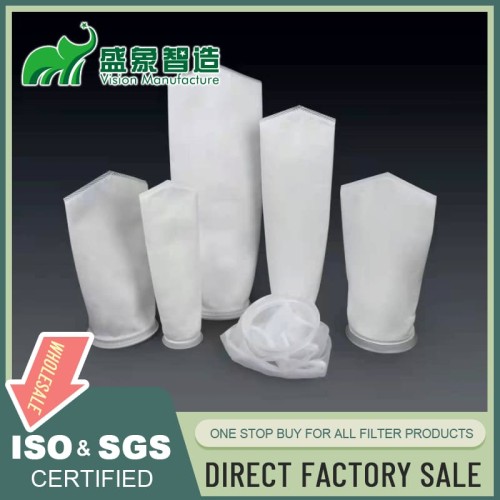
Nylon Mesh Filter Bags: Versatile Solution for Industrial Filtration
I. Introduction
Nylon mesh filter bags are essential components in numerous industrial filtration systems, offering unique properties that make them ideal for a variety of applications. This article provides an overview of nylon mesh filter bags, highlights their advantages in filtration, and discusses their key applications across different industries.
Nylon mesh filter bags are essential components in numerous industrial filtration systems, offering unique properties that make them ideal for a variety of applications. This article provides an overview of nylon mesh filter bags, highlights their advantages in filtration, and discusses their key applications across different industries.
II. Properties of Nylon Mesh Filter Bags
- Chemical Resistance: Nylon is resistant to many chemicals, making it suitable for filtering corrosive substances.
- Temperature Tolerance: Capable of withstanding higher temperatures, nylon mesh is versatile across various operational conditions.
- Durability and Strength: Nylon's inherent strength ensures longevity and resistance to physical stresses.
- Flexibility and Conformability: Easily adapts to different shapes and sizes, enhancing the seal and effectiveness of the filtration system.
- Moisture Absorption Characteristics: While nylon can absorb moisture, it maintains its structural integrity, making it suitable for wet applications.
III. Types of Nylon Mesh Filter Bags
- Monofilament Nylon Mesh Bags: Feature single-thread construction, providing excellent strength and uniformity, ideal for precise filtration needs.
- Multifilament Nylon Mesh Bags: Made from multiple threads twisted together, these bags offer enhanced filtration capabilities for more complex applications.
- Various Mesh Sizes and Micron Ratings: Available in a range of sizes to suit specific filtration requirements.
- Specialty Treatments and Coatings: Options such as antistatic treatments or hydrophobic coatings can be applied to meet specific industry needs.
IV. Manufacturing Process
- Nylon Fiber Production: Involves the polymerization of caprolactam to create nylon fibers.
- Mesh Weaving Techniques: Advanced weaving methods are employed to produce uniform and consistent net structures.
- Bag Construction Methods: Includes cutting, sewing, and sealing techniques to ensure high-quality bag construction.
- Quality Control Measures: Rigorous standards ensure that each batch of nylon mesh filter bags meets precise specifications.
V. Applications Across Industries
- Chemical Processing: Used to filter out impurities from chemical mixtures, protecting processing equipment.
- Food and Beverage Production: Ensures compliance with health standards by filtering particulates from consumables.
- Pharmaceutical Manufacturing: Critical for maintaining the purity of pharmaceutical products.
- Water and Wastewater Treatment: Plays a key role in the filtration and purification processes.
- Paint and Coatings Industry: Filters out contaminants that could affect the quality of the final product.
- Automotive Fluids Filtration: Used in the production and maintenance of automotive fluids.
VI. Performance Characteristics
- Filtration Efficiency: High efficiency in removing particulates from air or liquids.
- Flow Rate Capabilities: Designed to maintain sufficient flow without significant pressure drops.
- Particle Retention: Effective at capturing a wide range of particle sizes.
- Pressure Drop Considerations: Minimized to enhance system efficiency.
- Cleanability and Reusability: Nylon bags can be cleaned and reused, extending their service life and reducing waste.
VII. Design Considerations
- Bag Dimensions and Shapes: Customizable to fit a variety of filtration systems.
- Mesh Count and Micron Rating Selection: Tailored to specific filtration needs.
- Seam Construction: Ensures durability and prevents leaks.
- Attachment Methods: Various options for secure and easy installation.
VIII. Installation and Maintenance
- Proper Handling and Installation Techniques: Ensures optimal performance and prevents damage.
- Cleaning Methods and Frequency: Includes recommendations for maintaining filter efficiency.
- Inspection for Wear and Damage: Regular checks help maintain system efficiency and prevent unexpected failures.
- Storage and Handling Between Uses: Best practices for maintaining the quality and functionality of the mesh bags.
IX. Advantages of Nylon Mesh Filter Bags
- Excellent Balance of Filtration and Flow Rate: Provides effective filtration without impeding fluid flow.
- Good Chemical Compatibility: Suitable for a wide range of chemical applications.
- Durability and Long Service Life: Ensures cost-effectiveness through prolonged operational life.
- Cost-effectiveness: Offers a lower total cost of ownership compared to other filtration media.
X. Environmental Considerations
- Recyclability of Nylon Materials: Contributes to environmental sustainability.
- Energy Efficiency in Filtration Processes: Reduces energy consumption through efficient design.
- Proper Disposal Practices: Encourages responsible end-of-life handling to minimize environmental impact.
XI. Innovations and Future Trends
- Advanced Nylon Formulations: Enhancements in polymer chemistry improve performance and environmental footprint.
- Hybrid Designs for Enhanced Performance: Combining nylon with other materials for specialized applications.
- Integration with Smart Monitoring Systems: Incorporates sensors to track performance and predict maintenance needs.
- Sustainable and Eco-friendly Options: Develops environmentally friendly materials that degrade naturally without harming the environment.
XII. Case Studies and Success Stories
Examples from various sectors illustrate how nylon mesh filter bags have solved complex filtration challenges, improved process efficiency, and enhanced compliance with environmental regulations.
Examples from various sectors illustrate how nylon mesh filter bags have solved complex filtration challenges, improved process efficiency, and enhanced compliance with environmental regulations.
XIII. Conclusion
Nylon mesh filter bags are an essential component of modern industrial filtration systems, offering unparalleled versatility and innovation potential. As industries evolve, these bags continue to play a crucial role in advancing technology and sustainability.
Nylon mesh filter bags are an essential component of modern industrial filtration systems, offering unparalleled versatility and innovation potential. As industries evolve, these bags continue to play a crucial role in advancing technology and sustainability.
Leave a comment

